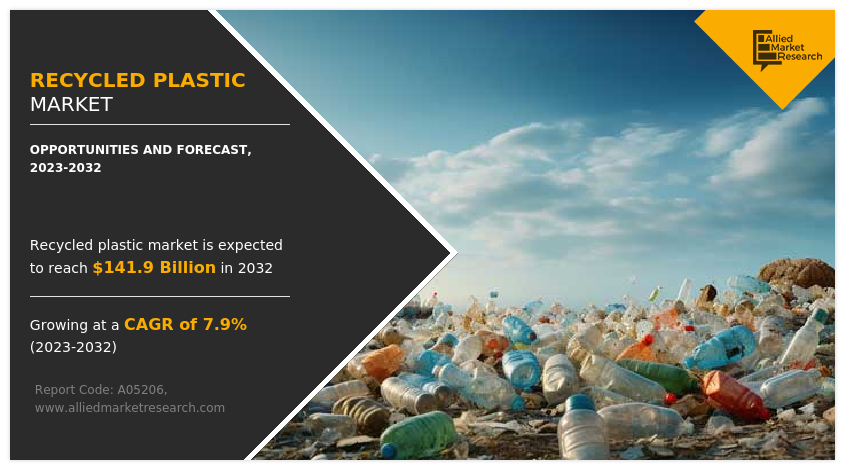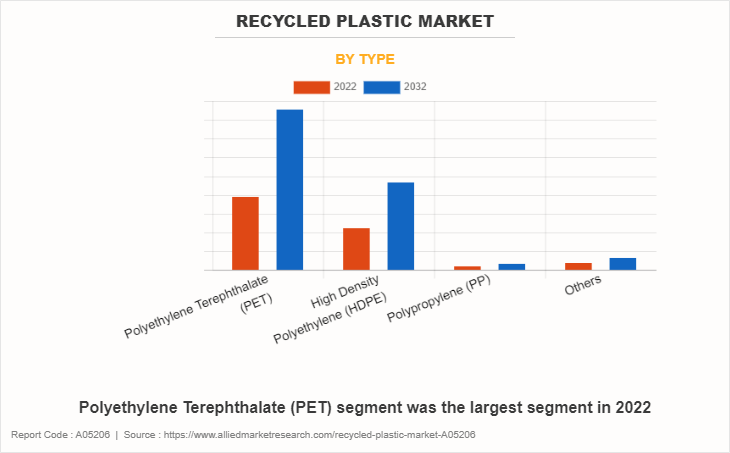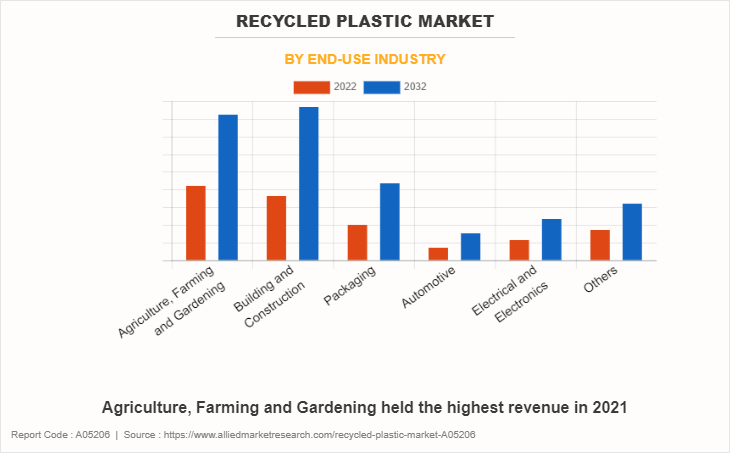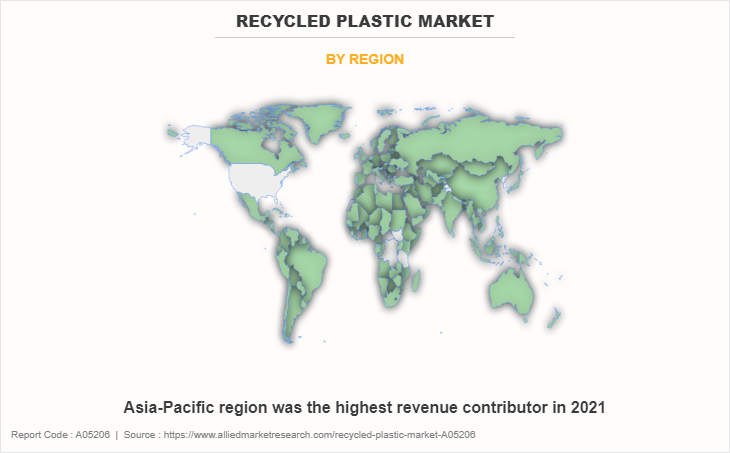Recycled Plastic Market Research, 2032
The global recycled plastic market size was valued at $66.7 billion in 2022, and is projected to reach $141.9 billion by 2032, growing at a CAGR of 7.9% from 2023 to 2032. The growth of the recycled plastics market is driven by the increasing demand for sustainable packaging solutions as businesses and consumers prioritize eco-friendly alternatives. In addition, stringent environmental regulations on plastic waste management compel industries to adopt recycled materials. Together, these factors reduce reliance on virgin plastics, minimize waste, and align with global sustainability goals, creating robust opportunities for the recycled plastic market to expand across various sectors.
Recycled plastics refer to plastics that have undergone a process of recycling which involves converting used or waste plastics into new materials that can be used for various applications. Plastics are synthetic polymers that are commonly used in a wide range of products due to their durability and versatility. However, the widespread use of plastics has led to significant environmental concerns or primarily due to their long decomposition time and their potential to pollute ecosystems. Used plastics are collected from various sources, such as households, businesses, and industrial facilities. They are then sorted based on their type and resin identification code, which helps in determining the appropriate recycling methods.

Increased awareness of environmental issues such as plastic pollution or ocean litter and greenhouse gas emissions has driven the demand for recycled plastics. Public awareness about the detrimental effects of plastic pollution on marine life or ecosystems and human health has grown significantly. Images of plastic waste in oceans and the harmful impact on wildlife have sparked a global movement to reduce plastic consumption and increase recycling efforts. Moreover, the concept of a circular economy promotes minimizing waste generation and maximizing the utilization of resources. Recycled plastics fit well into this model by reducing the demand for new virgin plastics, extending the lifecycle of plastic materials and decreasing the need for plastic disposal. Furthermore, many regions have introduced or strengthened regulations related to plastic waste management and recycling targets. These regulations often push companies to use recycled materials, driving demand for recycled plastics. Also, bans on single-use plastics in various forms encourage the adoption of more sustainable alternatives. Many companies are integrating sustainability into their business strategies. Using recycled plastics in products and packaging aligns with these initiatives and can be a marketing point for eco-conscious consumers.
Inconsistent regulations can create uncertainty for investors and businesses looking to enter the recycled plastics market. Without clear guidelines they might be hesitant to make substantial investments, fearing potential changes in regulations that could affect their operations. Varied regulations in different regions can lead to complex supply chains. Manufacturers and recyclers might need to navigate a web of different requirements, making it difficult to streamline processes and create efficient, cost-effective operations. Moreover, inconsistent standards can result in variations in the quality and safety of recycled plastics. Consumers and businesses might be reluctant to adopt recycled plastics if they are unsure about the consistency and reliability of the materials they are using. When regulations differ significantly between regions, it can lead to trade barriers. Exporting and importing recycled plastic materials might become challenging due to differing compliance requirements, potentially limiting the growth of international markets.
Advances in recycling technologies such as improved sorting and processing techniques, have made it possible to recover higher-quality plastics from mixed waste streams. Improved sorting and processing techniques enable the recovery of higher-quality plastics from mixed waste streams. This means that recycled plastic market analysis can now more closely match the quality and properties of virgin plastics. This opens up possibilities for their use in applications that require specific performance characteristics, such as strength, durability, and appearance. Moreover, the enhanced viability of using recycled plastics in various applications is a major opportunity. Beyond traditional uses like packaging, recycled plastics can now find their way into more demanding sectors such as automotive, electronics, construction materials, and more. This diversification not only expands the market but also helps industries reduce their environmental footprint. The rise of circular economy initiatives, where products and materials are designed to be reused or recycled, presents a significant market opportunity for recycled plastics. Companies and governments are increasingly prioritizing sustainable practices, and recycled plastics play a crucial role in achieving recycling and waste reduction targets. As recycling technologies advance, the cost of processing and producing high-quality recycled plastics is likely to decrease. This cost reduction can make recycled plastics more competitive compared to virgin plastics, especially as the price of raw materials and waste disposal rises.
The key players profiled in the recycled plastic market report include KW Plastics, Veolia, Green Line Polymers, Custom Polymers, Clear Path Recycling, B. Schoenberg & Co., Jayplas, Plastipak Holdings, Ultra Poly Corporation, and Joes Plastics Inc. Investment and agreement are common strategies followed by major market players. For instance, in October 2022 –Veolia introduced ‘PlastiLoop,’ a new brand of recycled plastics and services, at the K 2022 fair in Dusseldorf, Germany. This new product is made possible by Veolia’s extensive network of experts and its 37 plastic recycling plants around the world. This new product offers a large variety of ready-to-use recycled resins such as PET, PP, HDPE, PS, ABS, LDPE, and PC to its customers.
The recycled plastics market is segmented on the basis of type, end-use industry, application, and region. By type, the market is divided into polyethylene terephthalate (PET), high density polyethylene (HDPE), polypropylene (PP), and others. By end-use industry, the market is classified into agriculture, farming & gardening, building & construction, packaging, automotive, electrical & electronics and others. By region, the recycled plastic market is analyzed across North America, Europe, Asia-Pacific, and LAMEA.
The recycled plastic market is segmented into Type and End-use Industry.

By type, the polyethylene terephthalate (PET) sub-segment dominated the market in 2022. PET is widely used in single-use beverage bottles, food packaging, and textiles. Recycling PET reduces the demand for virgin plastic production and helps divert plastic waste from landfills and oceans. Moreover, many governments and regulatory bodies have been implementing stricter regulations related to plastic waste management and recycling. The concept of the circular economy, where products are designed to be recyclable and to re-enter the production cycle, has gained traction. PET is a key material in this context due to its recyclability. Companies are adopting circular economy principles, and this drives the demand for recycled PET. Recycling PET can be more cost-effective than producing virgin plastic from fossil fuels. Additionally, recycling PET reduces the energy and resources required for plastic production, which appeals to companies aiming to improve their resource efficiency and reduce costs. Advances in recycling technologies, such as improved sorting and cleaning processes, have made it more feasible to recycle PET effectively. This has increased the quality and availability of recycled PET, making it a more attractive option for manufacturers. These are predicted to be the major factors affecting the recycled plastics market size during the forecast period.

By end-use industry, the agriculture, farming & gardening sub-segment dominated the global recycled plastics market share in 2022. The use of recycled plastics in the agriculture, farming and gardening segments has been gaining attention due to several drivers that contribute to the growth of this market. Many governments and environmental agencies are implementing regulations and incentives to encourage the use of recycled materials across industries. Incentive programs and regulatory support can drive businesses in the agriculture, farming, and gardening sectors to adopt recycled plastics in their operations. Moreover, incorporating recycled plastics in agricultural practices promotes the concept of a circular economy, where plastics are recycled and reused instead of being discarded as waste. This helps divert plastic waste from landfills and oceans, contributing to waste reduction and minimizing the environmental impact. Furthermore, the growing awareness of plastic pollution and its impact on ecosystems has led to greater public consciousness about plastic consumption. This heightened awareness can influence farmers, gardeners, and agricultural companies to adopt more sustainable practices, including the use of recycled plastic market.

By region, Asia-Pacific dominated the global market in 2022. The Asia-Pacific region is experiencing a scarcity of traditional raw materials which has led to an increased focus on alternative sources such as recycled plastics. Using recycled plastics helps alleviate the pressure on natural resources. Consumer preferences are shifting towards eco-friendly products and packaging. Companies are responding by incorporating recycled plastics into their products, thereby driving demand for recycled plastic materials. Furthermore, many countries in the Asia-Pacific region have implemented or strengthened regulations related to plastic waste management and recycling. These regulations often include extended producer responsibility (EPR) schemes, recycling targets, and plastic waste import bans. These measures drive the demand for recycled plastics as companies strive to meet compliance requirements. Governments and organizations in the Asia-Pacific region are increasingly adopting circular economy principles. This approach emphasizes recycling, reusing, and reducing waste, which in turn boosts the demand for recycled plastic market forecast.
Technology Trend Analysis
Advanced sorting technologies leverage AI and IoT systems to enhance the precision of waste sorting in recycling facilities. These technologies use sensors, machine learning, and automation to identify and separate different types of plastics based on their composition, color, and size. This ensures higher recycling efficiency and produces purer recycled materials. By reducing contamination and manual errors, these innovations contribute to more sustainable and cost-effective plastic recycling processes.
The use of recycled plastics in 3D printing is expanding, offering a sustainable alternative for manufacturing. By transforming waste plastics into filaments, industries can create a wide range of products, from prototypes to functional tools, while reducing reliance on virgin materials. This innovation not only supports the circular economy but also lowers environmental impact, making 3D printing with recycled plastics a cost-effective and eco-friendly solution for diverse applications.
Chemical recycling involves breaking down plastics into their basic building blocks, called monomers, through processes like pyrolysis, depolymerization, or gasification. These monomers can then be repurposed to create high-quality plastics with properties similar to virgin materials. This method reduces reliance on fossil fuel-based plastics and enhances sustainability by enabling the recycling of materials that traditional mechanical processes cannot handle, addressing issues like mixed plastics and contamination.
Key Benefits For Stakeholders
This report provides a quantitative analysis of the market segments, current trends, estimations, and dynamics of the recycled plastic market Size analysis from 2022 to 2032 to identify the prevailing recycled plastic market opportunities.
- The recycled plastic market share and research is offered along with information related to key drivers, restraints, and opportunities.
- Porter's five forces analysis highlights the potency of buyers and suppliers to enable stakeholders make profit-oriented business decisions and strengthen their supplier-buyer network.
- In-depth analysis of the recycled plastic market segmentation assists to determine the prevailing market opportunities.
- Major countries in each region are mapped according to their revenue contribution to the global market.
- Market player positioning facilitates benchmarking and provides a clear understanding of the present position of the market players.
- The report includes the analysis of the regional as well as global recycled plastic market trends, key players, recycled plastic market growth by segments, application areas, and market growth strategies.
Recycled Plastic Market Report Highlights
| Aspects | Details |
| Market Size By 2032 | USD 141.9 billion |
| Growth Rate | CAGR of 7.9% |
| Forecast period | 2022 - 2032 |
| Report Pages | 294 |
| By Type |
|
| By End-use Industry |
|
| By Region |
|
| Key Market Players | B. Schoenberg & Co., Green Line Polymers, Jayplas, Veolia, Joes Plastics Inc., Clear Path Recycling, Ultra Poly Corporation, KW Plastics, Custom Polymers, Plastipak holdings |
The increasing awareness about plastic pollution and its detrimental impact on the environment has led to a growing demand for sustainable alternatives. Recycled plastics are seen as a way to reduce the reliance on virgin plastics, conserve natural resources, and minimize plastic waste in landfills and oceans, which is estimated to generate excellent opportunities in the recycled plastics.
The major growth strategies adopted by recycled plastics market players are investment and agreement.
Asia-Pacific is projected to provide more business opportunities for the global recycled plastics market in the future.
KW Plastics, Veolia, Green Line Polymers, Custom Polymers, Clear Path Recycling, B. Schoenberg & Co., Jayplas, Plastipak Holdings, Ultra Poly Corporation, and Joes Plastics Inc. are the major players in the recycled plastics market.
Polyethylene terephthalate (PET) sub-segment of the type acquired the maximum share of the global recycled plastics market in 2022.
Manufacturers and construction & building materials are the major customers in the global recycled plastics market.
The report provides an extensive qualitative and quantitative analysis of the current trends and future estimations of the global recycled plastics market from 2022 to 2032 to determine the prevailing opportunities.
The increasing interest in sustainability and circular economy solutions has attracted investments and funding to the recycling industry. This has led to the expansion of recycling facilities and the development of new technologies, which is estimated to drive the adoption of recycled plastics.
The demand for advances in recycling technologies have made it possible to process a wider range of plastics and improve the quality of recycled materials. Innovations in sorting, cleaning, and processing techniques have made recycled plastics more viable for a variety of applications., which is anticipated to boost the recycled plastics market in the upcoming years.
Loading Table Of Content...
Loading Research Methodology...



